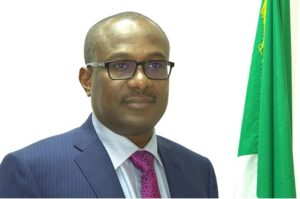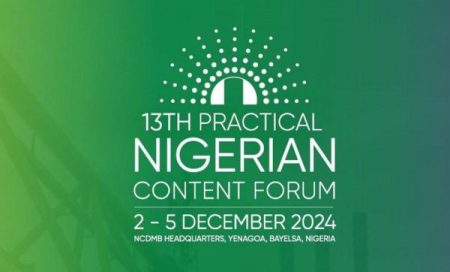
OPeOluwani Akintayo
19 April 2018, Sweetcrude, Lagos — The Oil and Gas Trainers Association, OGTAN has conferred the Local Content Development Achievement Award on the Executive Secretary, Nigerian Content Development, and Monitoring Board, NCDMB, Engr. Simbi Wabote.
The award was presented to him at the OGTAN’s 1st National Education Summit held in Lagos on Monday in recognition of the remarkable achievements he has led the Board to record in less than two years of his assumption of duty.
President of the group, Dr. Mayowa Afe asserted that NCDMB has exceeded targets in the implementation of the Nigerian Content Act and contributed immensely to the development of youths of the country.
Accepting the award, the Executive Secretary credited staff of the Board for the successes attained by the Board, noting that they collaborated and bought into the vision he brought to the Board.
He challenged staff to work even harder and innovate more initiatives, adding that there was a lot of work to be done to deepen the implementation of local content practice.
“How can we benefit all sectors of the economy, how can we impact the impact the military and help them domesticate their clothing and hardware?”
He stated that a lot of progress was being made in the implementation process and challenged every stakeholder to impact their sphere of influence and make positive contributions to Nigerian Content development.
Speaking earlier on the topic “Sustaining Local Content through Quality Education and Training,” Wabote harped on the need to domicile the production of educational materials used at the primary, secondary and tertiary levels.
He informed that data from National Bureau of Statistics (NBS) showed that about five million pupils are enrolled into our primary schools every year while the total population in all the primary schools is about 24 million.
He added that “24 million pupils mean that we should be producing at least 50 million pencils every year in our country. Imagine the number of employment generated if this is the case and the retained value if such endeavor is done in-country. We need about two million computers every year just for our secondary and university students. These are just some of the opportunities that could help bolster our local content practice. There are much more from shoes to uniforms and the rest. That is the reason we have always advocated for sectorial linkages to other sectors of the economy such as ICT, power, and construction if we truly want to deepen our Local Content practice.”
He explained further that there are five key parameters required for sustainable local content practice, listing some of them to include the existence of a Regulatory framework to specify the roles and expectations of stakeholders in the implementation process and capacity building of local manufacturing, infrastructural development, and human capacity.
Other necessary parameters include Periodic gap analysis to determine gaps that are needed to be closed in the areas of skills, facilities and infrastructure, Research and Development and the provision of Funding and Incentives to attract new investments and keep existing businesses afloat where required.
Dwelling on the Board’s Human Capacity Development programme, the Executive Secretary said the Board put in place “the 60-20-20 principle in which 60 percent of the Board’s and industry’s training resources and efforts will be devoted to providing young Nigerians with specialized skills they need to secure employment. 20 percent will be geared towards improvement of the productivity of already employed personnel while another 20 percent of spending will be used for training on soft skills. Under the new strategy, beneficiaries will be provided with qualitative skills and international certifications that will position them for employment within and outside Nigeria.”



